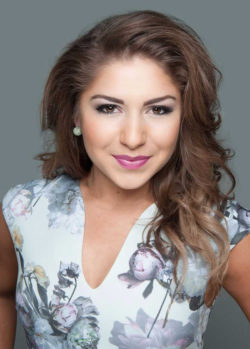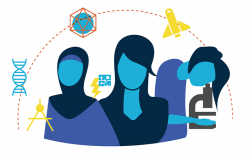Get to know Tamara Allard – Scientist, Advocate, and Notable Woman in STEM
Tamara Allard is a Ph.D. student at the University of Maryland in College Park where she studies neurocognitive development, specifically memory and brain development in children between three and five years old. Tamara was born and raised in Yakima, Washington was crowned Miss Sunfair 2020, and is an advocate for access to higher education, especially for those students who are furthest from opportunity.
Q: What was your education and/or career path? How did you get where you are now?

I was born and raised in Yakima, Washington. I started my educational journey in Yakima’s East Valley School District, where I attended Terrace Heights Elementary and then East Valley Intermediate (now East valley elementary). When I was in second grade, I was diagnosed with ADHD. My disorder made it difficult for me to focus in class, and I struggled to stay on pace. It caused me a lot of heartbreak as a student, and I had a hard time with several subjects, specifically math and reading. Originally, I was planning to attend East Valley High School. However, that is not where I ended up. Luckily, I found the Washington Academy of Arts and Technology (WAAT), an online school that could provide a more individualized education that also accommodated my athletic career in gymnastics. I thrived at WAAT and became the valedictorian for my graduating class.
After high school, I was planning to pursue gymnastics in college, but during my junior year, I tore my ACL. This changed my entire outlook on college and my future. I still wanted to pursue higher education, but now I started to think about my career rather than competitive gymnastics. After dealing with the pain of my torn ACL, I decided to focus on Kinesiology at Washington State University (WSU) so that I could become a physical therapist. However, in my second year, I decided to pursue a simultaneous second bachelor’s degree in psychology, because I thought it would increase my chance of being accepted to graduate school. Little did I know psychology would become my passion. As I began college, I also became involved with the Miss America Scholarship Organization. I saw how other women had used the competition to talk about really important issues like access to higher education, and I wanted to be a part of that. I also wanted to pursue scholarships that would help support my education.
In my last two years of college, I became deeply involved with several research labs at WSU. This made me realize that I wanted to pursue a career in higher education as a scientist and educator. Therefore, I applied to several Ph.D. programs. Now, I am a third year joint Masters/Ph.D. student at the University of Maryland in College Park, where I’m studying memory, brain development, and sleep in early childhood (e.g., aged 3 to 5). Specifically, we’re studying the impact of napping on child brain development!
Q: What/who were some of the most important influences that guided you to STEM?
Fortunately, I have had several impactful mentors who helped me in my STEM journey. The first was Dr. Christopher Connelly, Principal Investigator of the Exercise Physiology & Performance Laboratory and Assistant Professor of Kinesiology at Washington State University. I had the good fortune of working in one of his labs during my time at WSU. He gave me the opportunity to get hands on with research and allowed me to lead data collection for one of his studies. In his lab, I gained experience that most people only get as a postbaccalaureate employee or as a graduate student. It meant the world to have him believe in me as an undergraduate.
The other would be Dr. Masha Gartstein, a clinical developmental psychologist and professor at WSU. She was doing the kind of research that I wanted to do – she was studying little kids and how they develop. I worked in her lab for a little over a year and gained great experience working with children, collecting EEG data, and attending academic conferences. She empowered me to go to graduate school and purse a career in science. It was so important for me to see a full-fledged, female professor that was also a mom. She showed me that I didn’t have to limit myself to just one dream.

Q: What is your favorite part of your STEM research?
One of my favorite parts about working with science is doing data analysis. It can be very straightforward, assuming you’ve set up your experiments correctly. The data does not lie! The results you get are the results you get, and it is up to you to figure out why. I also believe that STEM research is critical to making change in public policy. To have lasting change, we need to have quality legislation that supports that change. Research and data are so important in informing that legislation. Hopefully, the work I am doing will be able to help create better policies in the future.
Q: Were there any unique cultural experiences for you growing up in Yakima?
One of the things that has become increasingly clear is that my experience growing up in Yakima was very different than many of the people I work and go to school with. I am Hispanic, and I grew up in a predominantly Hispanic community. Growing up, I was always surrounded by amazing and inspirational people, but when I moved to Maryland, I began to see just how under-resourced my home area is. One of the biggest concerns I have now, as someone who cares deeply about education, is that there are still a lot of students in Yakima that don’t have access to the internet or the technology they need to thrive in STEM. I believe that we can change that.
Q: What do you consider your most significant achievement in STEM?
Honestly, graduating high school as valedictorian was a major achievement. I had some serious challenges when it came to learning, and I wasn’t sure how things would turn out. Fortunately, I had an alternative public high school available to me and, my parents provided resources that shifted my course. From there, graduating from college, and then getting accepted to graduate school, were both huge accomplishments. I can’t help but look back at my past and how far I’ve come. It’s helped me realize that struggling in school isn’t necessarily a child’s fault, maybe they just don’t have access to the resources they need to succeed.
Q: Are there any stereotypes about women in STEM you’d like to personally dispel?
There is this idea that if you are both smart and a woman, then you cannot also be feminine. Specifically, for many years Hollywood has perpetuated the “nerdy girl” trope (e.g., Velma from Scooby Doo). In other words, you cannot be the beautiful, fun, cool girl and be the smart girl. This trope is not only inaccurate, but it also hurts women because it discourages them from pursuing certain careers. In the real world, women are much more complex than the simplistic stereotypes proscribed by movies. Personally, I like to think that my time in the Miss America Organization gives me dimension and makes me a more dynamic person. Being a part of an organization that has historically emphasized beauty does not preclude me from science. Nor does my role as scientist make me any less beautiful in an evening gown.
Q: What unique qualities do you think girls and women bring to STEM?
I do not think that there is an inherent difference between the sexes when it comes to STEM. I don’t think men are better at STEM than women, and vice versa. However, I do think we have different world views. Growing up female, I automatically have different experiences from someone who grew up male. Those experiences have shaped the way I look at the world and will also help shape the scientific questions I ask! Importantly, it is a diversity of research questions that helps to further scientific understanding. If we have a variety of perspectives asking scientific questions, we will have a much broader understanding of the world around us.
Q: How do you see science, technology, engineering, and/or math working together in your current job?
In my field of neurocognitive development, I use science, technology, engineering, and math on a daily basis. Math, specifically advanced statistics, is the main tool I use to quantify my scientific findings. Furthermore, technology and engineering come together when we I collect neuroimaging data using MRI and PSG. We also use specialized programs that take advantage of machine learning to help move our research forward. And of course, as a scientist, the scientific method is present in my life pretty much all the time.
Q: What would you like to say to young women thinking about beginning a career in STEM?
It sounds so cliché, but when it really comes down to it, I want to tell young women that, “You can do it!” When I was younger, science was the furthest thing from what I wanted to do. No one had told me it was an option for me, and I definitely could not have come to that conclusion on my own. The fact is, it does not matter where you come from or even how smart you are, you can be whatever you set your mind to. I mean, look at me. I struggled in school when I was younger and I came from a low-income area. All the cards were stacked against me, but I did it anyway! Science shows us that the number one factor to determine success is a growth mindset. Having a growth mindset means that you believe you are capable of doing better if you work hard and continue to learn new things. I believe you in you! You should too.
Q: What do you think is unique about Washington and the STEM careers in our state?
Even though I moved away to pursue my master’s degree, I constantly miss Washington. I recently took my significant other back to Washington, and he couldn’t believe how beautiful it is. And he’s right. Washington really is one of the most beautiful places. I also think that Washington is a very unique place for STEM careers with a booming tech sector, and two major public universities – WSU and the University of Washington – where I can attest that amazing research happens.
